DAVE'S DIARY - 1 JUNE 2014 - RODNEY CROWELL CD REVIEW
CD REVIEW – 2014
RODNEY CROWELL
TARPAPER SKY (NEW WEST-WARNER)
RODNEY CROWELL CHANNELS BILLY JOE SHAVER
“Sometimes, I think about leaving/ and if I had some plans to do/ I might even crank up the engine/ and roll down the street just for show/ nobody said life was easy/ but that doesn't mean it ain't right/ I don't want nobody else with me/ when it comes down to the corner of my mind.” - I Wouldn't Be Without You - Rodney Crowell.
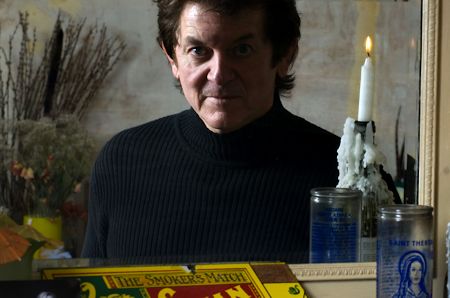 |
The Lone Star State of Texas is a mighty big place so it's no surprise that two great Texan singer-songwriters had a cosmic collision on the Lost Highway .
Billy Joe Shavers hails from Corsicana near Waco and wrote I Couldn't Be Me Without You about his first ex-wife Brenda whom he wed three times.
Houston born Crowell, 63, penned I Wouldn't Be Me Without You - a song with similar title and sentiments - on his 16 TH album Tarpaper Sky.
But it's unlikely to be about his former wife Rosanne Cash whom he produced and collaborated with during their marriage from 1979-91.
Crowell guests on her 15th album The River & The Thread on When The Master Calls The Roll - a song he wrote with her second husband and producer John Leventhal.
Shaver, now 74 with an extra two brides on his belt, wrote his song four decades ago.
Fellow Texan and goat roper Rodriguez, now 62, had a #3 hit with it back in 1975 on his seventh album Love Put A Song in My Heart .
Billy Joe thought it was so nice he has recorded it at least twice - first on his Australian duet disc Live From Down Under with singing Texan crime novelist Kinky Friedman in 2002 at The Basement in Sydney .
It was on Texas Jewboys pianist Little Jewford's Sphincter Label in Houston and featured cover photography by former Nu Country FM treasurer John Karpik who commutes between Brunswick and Blairgowrie when he's on the road again.
It was also on his 2011 Live At Billy Bob's CD-DVD
But it's not on his 23 rd album Long In The Tooth - produced by Ray Kennedy and Gary Nicholson - or Shotgun Willie Nelson's new album The Wall that features a Billy Joe-Willie duet on his tune Hard To Be An Outlaw and From The Git Go .
Billy Joe included the latter two songs on his new album that also features a rap tune.
"I didn't know it was that easy. I took a crank at it and went crazy and did it," Shaver says of rapping - a sentiment shared by old many more.
But back to Houston born Crowell who entered the world under a tarpaper sky that overlooked the oil refinery polluted city on August 7, 1950.
Billy Joe shared the same month - August 16 - but arrived more than 10 years earlier.
GRAND PATERNAL PATTERNS
“My grandfather wore big suspenders/ a grey Fedora hat, a sine on his shoes/ tobacco stains on his chin, gin on his breath/ and starch ion his shirt.” - Grandma Loved That Old Man - Rodney Crowell.
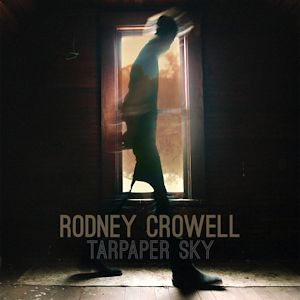 |
Crowell recalled his journey and parents on previous discs - The Houston Kid (2001), Fate's Right Hand (2003), The Outsider (2005) and Sex and Gasoline (2008) and his Chinaberry Sidewalks autobiography published in 2011. His hard-drinking father J.W - a part time musician and steadfastly religious mother Cauzette - fuelled his reality rooted tale exploring their poverty, domestic violence and corporal punishment. That was about the same time Rosanne Cash's Memoirs - one of her recent books - hit the shops. Crowell released his debut LP, Ain't Living Long Like This , in 1978. |
A year later, he produced Rosanne Cash's debut Right or Wrong , featuring four of his tunes.
They wed in 1979 and settled in Nashville to be closer to Cash's family as they raised four daughters, including one from Crowell's previous marriage.
The creative partnership included Cash's Seven Year Ache - again produced by Crowell - and Rodney's solo releases that were a healthy hybrid of traditional country and rock rhythms.
He finally achieved mainstream success with fifth album, 1988 blockbuster Diamonds & Dirt , with five No. 1 hits.
"I thought I needed to recapture country radio, but my heart wasn't really in it," Crowell revealed in a recent interview.
"Out of fear I went back and made some mediocre records. I was trying to please the record company, who gave me a whole lot of money to make records for them which is like a bad drug for me. I would say '94 and '95 was my low point, trying to recapture something so I just shut it down. Plus I'd just gotten divorced, and had the girls living with me. I needed to do that, and it was a really good thing, because in that time period it slowed down."
Crowell wed North Carolina born Claudia Church in 1998 - six years after meeting her as an actress in his video Loving All Night.
He also produced Church's self-titled 1999 disc.
But that then and this is now.
Tarpaper Sky reunited Crowell with longtime collaborator Steuart Smith and enriched his genetic mining with Grandma Loved That Old Man - inspired by his grandparents - and maternal memories of Jesus Talks To Mama.
FEVER ON THE BAYOU
“Creole belle, dancin' in the rain/ I love to hear hey laughin'/ I love to hear her sing/ I've got money, I've got lots of time/ she makes me feel so funny when she spends my dime.” - Fever On The Bayou - Rodney Crowell-Will Jennings.
"For me, my recording career really began about 13 years ago," Crowell confessed.
"Since then, I've been pretty productive because I found it. I wrote a lot of songs as a younger man just on the fly, just having fun and taking it for granted.
"Shit just came to me. Whether I was worthy enough of whatever dollop of inspiration I got at whichever particular time is debatable. I'm certainly more worthy of it now. Inspiration that comes to a man of my age in his early 60s, it's a different brand of inspiration and you have to earn it. If you put down the shovel, it's not going to come. I said I'm going to start defining myself, and what I'm going to do for the time being is anything I'm afraid of. Tarpaper Sky is much broader than anything I've done in the past couple of years. The songs are a little more broad-stroke, user-friendly songs, but done singularly."
The up-tempo Fever On The Bayou has its roots entrenched in the mists of time in the Deep South .
“Twenty years plus, Will Jennings and I wrote that,” Crowell recalled.
“Will's a famous songwriter who wrote all those classic movies songs like My Heart Will Go On for Titanic and Up Where We Belong and Steve Winwood's Arc of a Diver . Anyway he's a Texas boy and we hit on that a long time ago. We had a conversation about the Cajun characters we worked with in our separate youths. We had those first two verses and a chorus and a melody 20-something years ago, but we tried and tried, and everything we came up with was trite and went nowhere.
I never completely abandoned it. Just a year and a-half ago, I was having a conversation with a man in the airport, and one word tripped the wire. I said, "Ah, I need to write that last verse in Cajun patois. That's the only way we're gonna get out of this." I went home and figured out my own version of broken English-slash-Cajun patois and, there you are, a song was born. It just took that long to track it down.”
THE LONG JOURNEY HOME
“We ran off chasing rainbows/ beneath the blue Montana sky/ and we self-proclaimed our freedom with a roar/ we crossed those raging rivers and we drank the taverns dry/ and we bowed out heads to legends gone before.” - The Long Journey Home - Rodney Crowell.
Crowell kicks off his album with The Long Way Home .
“I was in Livingston , Montana , a literary community where I spend a lot of time,” Crowell revealed.
“It's a very small town but 40 of the citizenry are published authors and I like to be around authors. There's something legendary about conversations, you know, legends of the people who had been there, like when Sam Peckinpah holed up in the Murray Hotel. Jim Harrison was there writing his great stuff and Tom McGuane and there were films made there.
“It's just a great creative stop under that big old sky in Montana . Anyway, I was making the trip back driving from Livingston to Salt Lake City to get on a plane to fly back to Nashville , and on that road, I composed the lyric based on making the long journey home.”
Crowell praises the organic nature of recording Tarpaper Sky .
“Conversation is a really good way to get things done,” the singer explained.
“We discussed recording techniques from the late '50s and even into the early '60s - records we really liked how they sound.
We decided to record without headphones. And when you do that, everything has to count. It's no longer about production. It's about performance. You can't go back and fix things or run them through the tuners or processors of modern recording. It's an old form of recording. So we committed ourselves to that and enjoyed the process completely. Voila, we got a record.”
So where did he draw his recording techniques?
“Oh, you know, any of your Patsy Cline records and some of those Jim Reeves records,” Crowell added.
“If you go into the '60s, Ray Charles' Modern Sounds in Country and Western Music is all live performance. Everything Johnny Cash did in the late '50s and early '60s is all performance.”
Tarpaper Sky features a lot of musicians that played on Diamonds & Dirt but doesn't try to replicate the sound.
“I'm not that stupid, it can't be done,” Crowell says.
“That's the reason we threw the headphones out of the studio, and we just set up a circle of electric guitars, basses, drums, and everything, and we just played. It wasn't to recapture anything, but it was to create with a team I feel very comfortable with.”
And the songwriting?
“With language, when I was a younger writer and less experienced and actually more fearful, I actually would let things pass or think things actually did the job when perhaps maybe they didn't,” Crowell said.
“But something about the inspiration of youth, the passion and the fire holds it together in a way that in later years doesn't happen. To me, the blessing of being an artist is working at it every day, and going to work every day. Maybe taking one day off. When I'm on the road, that's different - that's the work I'm doing. But when I'm home I'm working every day. When I think of Picasso, the man got up and went to work every day. Nabokov, the man got up and went to work every day. I'm not comparing myself to them, but I'm comparing the experience. If you are lucky enough to spend a lifetime as a working artist, the work, the day in and day out rhythm of the work, becomes the most important thing about it. And it just leads to clarity and a deeper focus. And I enjoy and love the work. I do know this: the inspiration that comes to a 25-year-old man or woman is different than the inspiration that comes to a 55-year- old man or woman artist. And the 25-year-old inspiration is more forgiving than the 55-year-old inspiration.”
MARY KARR BURNS IN A TARPAPER SKY
“I heard a siren, and you came to mind/ you were the pretty part of us, I'm what's left behind/ the equation's remainder, the last standing sign/ God, I'm missing you/ you're every curled rose bud, entranced in my eye/ each turned a cold collar and your gaze slides by/ the sanded down moon/ In a tar paper sky, God, I'm missing you.” - God I'm Missing You - Rodney Crowell- Mary Karr.
And the album title?
“Tarpaper sky comes from a line from a song called God I'm Missing You ,” Crowell explained of a song he wrote with poet Mary Karr with whom he has also produced the 2102 album KIN.
“The image is there's a sanded-down moon in a tarpaper sky. You know, I grew up poor in East Houston . I used to be ashamed of it, but I'm not any more. It's kind of a badge of courage now. So our roof leaked. There were big holes in the roof, and you could see the sky. Down there in that climate, there was no real insulation. It was just tarpaper. When you would look up through the hole in the ceiling, there'd be crinkling pieces of tarpaper that would cover the plywood that was the roof. That's where my portion of that image comes from. Sanded moon was Mary's line and tarpaper sky was mine. For the most part, when I collaborate, I'm not one to draw attention to who recreated what line because to me that becomes an intellectual pursuit rather than an understanding of what we created as one thing. But in that case, “tarpaper sky” is my line but it never would have happened if Mary hadn't come up with “there's a sanded-down moon.”
 |
Crowell recorded KIN just before his 2013 Grammy-winning duets album Old Yellow Moon with Emmylou Harris - his former boss when he began in her Hot Band in the seventies. Hank DeVito, Emory Gordy and prolific former Pure Prairie League singer and singer Vince Gill also played in the Hot Band . Trivia buffs may recall Gill's late father Stan was an Appellate Court judge who played banjo in his chambers in adjournments and shared his profession with the lawyer fathers of Texan peers Guy Clark and Townes Van Zandt. |
Townes - son of corporate lawyer Harris Williams Van Zandt - was born in Fort Worth , Texas , to a wealthy oil family.
He was the third-great-grandson of Isaac Van Zandt - a prominent leader of the Republic of Texas and second great-grandson of Khleber Miller Van Zandt, Confederate Major and one of the founders of Fort Worth .
Van Zandt County in east Texas was named after his family in 1848.
Clark , now 72, eulogised his lawyer father in his song Randall Knife .
THE FLYBOY AND THE KID
“May the wind be at your back/ and the world sit at your feet/ may you waltz across Wyoming / with a rose clutched in your teeth.” - The Flyboy & The Kid - Rodney Crowell.
Crowell attributes much of his new disc to old mates Smith and Clark - not Wesson.
“Well, the discussion between myself and guitarist Steuart Smith was landscape painting and we talked about Cèzanne a lot, and we tend to talk in terms of art when discussing music,” Crowell explained.
“Our sense was that we were recording these songs that had a certain amount of pastoral landscape tonality to it. There were other songs that I recorded that in the end were songs that were very worthy of being on the album, but the decision was to let the pastoral watercolors set the tone for this album.”
Crowell said Clark inspired The Flyboy And The Kid .
“I had Guy Clark in mind, and I had that old Irish poem May The Road Rise To Meet You ,” Crowell recalled.
“I started writing it in Ireland , and I was thinking about Guy. But you know, there's the line “may you always stay in touch with the things that keep you young,” and I understand that that would trigger “may you stay forever young.” It's only natural, but I wasn't thinking about Dylan's song although of course I recognise that as a masterwork.
“Well, I wasn't thinking about paying a debt with that song, I was actually thinking, “I love my friend.” It was more of a love song to a friend and the wishes I had for him. That song of Dylan is about the things he wishes for his child. In my case, it was the things I wished for my friend.”
SOMEBODY'S SHADOW
“I've seen her in the streetlight once/ all edgy black and white/ a flash of incandescence/ shape-shifting in the night/ I spied her in a clearing/ out beyond the switching yard/ I've seen her in a fever dream/ and the Empress tarot card/ on every crooked sidewalk/ I've ever stumbled down/ where all roads lead to nowhere/ on the other side of town.” - Somebody's Shadow - Rodney Crowell-Quinten Collier.
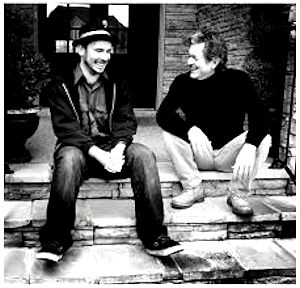 |
Crowell wrote Somebody's Shadow with Quinten Collier - a 30 year old poet and novelist from Grand Junction , Colorado . They met in 2010 when Collier won the American Songwriter Lyric Contest Grand Prize for his song Roses And Wine . It scored him a co-write with Crowell in Nashville . They never finished the song they started that day in Crowell's home but hit it off and stayed in touch. Since then Collier has written at a feverish pace, producing two novels, a book of short stories, several plays, and dozens of song lyrics. |
“I crank it out,” Collier revealed in a recent interview after sending Crowell a brace of lyrics and poems.
“Rodney originally asked me to add extra stuff to some lyrics I'd written that he liked, so I just rolled out a bunch of ideas and I guess it became a poem. He took that and shaped it into Somebody's Shadow .”
Crowell elaborated.
“I took reams and reams of the stuff that Quinten had given me, and he had all these lines that I was able to stitch together,” Crowell recalled.
“I think at least half of that language was his. And it was exciting work for me, trying to meld my sensibilities with Quinten's.”
Most of Collier's work remains unpublished except three poetry collections put out by an underground press.
“I was just ecstatic to have the song appear on the album,” Collier says.
“I've been working really hard at this other stuff, but nothing has really come to fruition. I've been writing lyrics since I was 13 years old and I strive to write the best stuff. I never wanted to just be a writer. I wanted to be the best writer.”
Years ago Crowell told Collier that he had plans to put the song on his next solo album and Collier was honored Crowell chose to collaborate with him on an album cut.
“The fact that he has that much respect for me is what really matters about this whole process,” he said.
“It's a fantastic complement and I'm incredibly appreciative.”
THE CHEATING SIDE OF TOWNES
“It's the time and the place/ every line on your face/ it's the truth and the lie/ it's to live and to die/ oh what a beautiful world.” - Oh What A Beautiful World - Rodney Crowell.
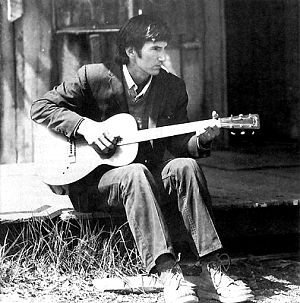 |
Crowell makes every mortality mile a winner, right to the fitting finale - Oh What A Beautiful World inspired by his long deceased mate and rival in love Townes Van Zandt. Townes, then 52, shared his death date but not year 1997 with Hank Williams who went to God in the back of a Cadillac 44 years earlier in 1953. Van Zandt and fellow Texan legend Guy Clark both toured here in the eighties and nineties and played French Island magnate Paul Madigan's famed Druids Lodge in Brunswick before Billy Joe Shaver, Joe Sun and Tiny Tim. Crowell recalls living in Austin for a few months in 1974 but couldn't remember why he returned to Nashville . |
"Oh, I don't know," he recalled in another recent interview.
"I do know! Townes Van Zandt was fucking my girlfriend. Well, that was part of it, but I said, 'I'm out of here.'
" Austin was good. It didn't cost a lot, and the light was on. KOKE-FM was on, and hippie girls were pretty. I'd just been double-timed by this girl in Nashville so I moved to Austin . It was the hippie Shangri-La, it truly was. I lived on Enfield Road , but there was Lake Travis and Barton Springs and there was sunshine. And I was young. Then Emmylou came through and played the Armadillo ."
Crowell hooked up with cosmic country scene, immortalized in the Jan Reid book The Improbable Rise Of Redneck Rock , but two months after arriving, Emmylou Harris recruited him to sit in with her band for a show.
"She doesn't remember this, but I remember this clearly," Crowell joked.
"She said, 'hey, I got an extra ticket. You want to go to L.A. tomorrow?' I said yeah, it was first class. Back then, you could travel on someone else's ticket so I went to L.A. and stayed for seven years. Literally, just like that.
"One night sitting in with her at the Armadillo, and the next day I was headed to L.A. "
Nashville was a nouveau oasis for many Texan singer-songwriters.
"It was a great moment, a little Paris in the Twenties," Crowell recalled.
"I got there just at the tail end of when Guy and Susanna were in East Nashville , and Townes was in and out of town. Townes would come in off the road and he'd be upstairs kicking and Jonesing whatever he was Jonesing. All the songwriters would gather downstairs at Amy Martin's house and bore each other to tears playing their songs at each other and waiting for Townes to come down. Then Guy would show up and everybody would straighten up and start putting their best stuff out. You didn't play shitty songs in front of Guy."
Some of that magic was captured in the documentary
Crowell admits to having songs for a new album already written, and he and Harris are talking about a follow-up to Old Yellow Moon.
"I'm far more deliberate in my songwriting," he says.
"The work's harder but I'm willing to shoulder the work to get the end result, and I love the day's work. There's nothing more important than the day's work.
"And I'm just getting started," he added.
TOWNES NOTE
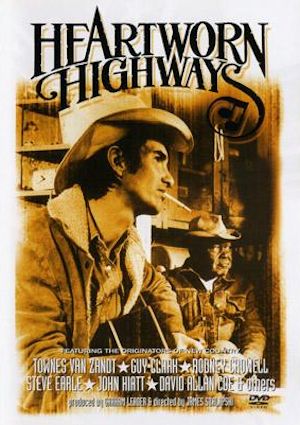 |
Acclaimed documentary Heartworn Highways, filmed in Texas and Tennessee in 1975 and 1976, featured Townes upstaging Crowell and seven times wed duo Steve Earle and David Allan Coe. Former convict-actor-singer-songwriter Coe, now 74, was filmed at Tennessee State Prison. Larry Jon Wilson, Charlie Daniels, Steve Young, Gamble Rogers and Barefoot Jerry band also appear in the docco, belatedly released on VHS in 1981 and re-released on DVD in 2003. Earle and Crowell perform a duet on Stay a Little Longer , Crowell and Guy Clark duet on Ballad of Laverne and Captain Flint , Crowell sings Young Girls Hungry Smile and Bluebird Wine , Townes revives his classics Pancho & Lefty and Waitin' Around to Die. Zandt's Roadsongs version of Rolling Stones Dead Flowers was used during the final scene of Coen Brothers' 1998 film, The Big Lebowski - it was also included on the soundtrack. |
Since his death Van Zandt's recordings have been licensed by his family for use in films and TV shows including Stepmom, Six Feet Under, In Bruges, Crazy Heart, Leaves of Grass, Seven Psychopaths, Deadwood, Breaking Bad and True Detective.
In the Country Strong movie starring Tim McGraw and Gwyneth Paltrow the character of Beau Hutton is touted as "the next Townes Van Zandt."
2012 documentary Low & Clear revolves around Van Zandt's son JT fly fishing for steelhead in British Columbia with fishing mate Xenie and features Townes songs Dollar Bill Blues and My Proud Mountains .
The latter is performed by JT at the end of the film.
In 2006 the Be Here To Love Me docco, chronicling the artist's life and musical career, was released and biography To Live's To Fly: The Ballad of the Late, Great Townes Van Zandt by John Kruth emerged in 2007.
In April 2008 the University of North Texas Press published Robert Earl Hardy's biography A Deeper Blue: The Life and Music of Townes Van Zandt.
The book featured eight years of research, including interviews with Mickey Newbury, Jack Clement, Guy and Susanna Clark, Mickey White, Rex Bell, Dan Rowland, Richard Dobson, John Lomax III, Van Zandt's brother and sister, cousins, and all three ex-wives and many others.
Americana duo Shovels And Rope named their faithful dog Townes Van Zandt.
And prolific recent Australian tourist Steve Earle named eldest singing son Justin Townes Earle after Van Zandt.
Earle wrote Fort Worth Blues as a tribute to Townes in the late 1990s and in 2009 released Townes - an album that featured all covers of Van Zandt songs.